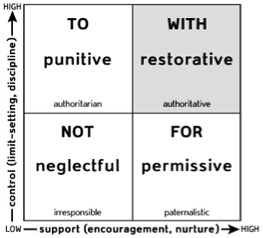The Essence of Restorative Practices
The essence of restorative practices is disarmingly simple: that human beings are happier, more productive and more likely to make positive changes in their behaviour when those in positions of authority do things with them, rather than to them or for them (adapted from Wachtel 2004).
Increasingly parents, caregivers and community groups are seeking out support and direction around managing the young people in their care. Building, enhancing and restoring relationships across any workplace, community group, school or culture, is essential for a strongly connected, empathetic, functioning society.
Restorative Practices at Mount Roskill Grammar School; The Roskill Way
At Mount Roskill Grammar School, we believe that learning happens by working with students, parents and whānau. In practice this means that we work to help our learners understand the impact of their actions and to support them as they begin to repair any harm that has been caused.
These principles underpin not just our disciplinary system but are fundamental to who we are as a school and what we believe. They form the context for our overarching school values of manaakitanga, whanaungatanga, and tūmanakotanga. This is the ‘Roskill Way’. The Roskill Way centres on an approach where we work with students in a high support / high control framework. The diagram below, often called the Social Discipline window, provides a visual explanation of the thinking behind this way of approaching issues.


